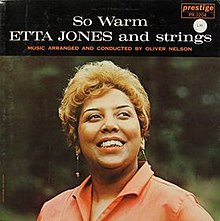I hope this proved to be a good investment for Weinstock. Jones had some popularity at the time--Don't Go to Strangers sold a million copies, though she never attained that level of success again. And her place in the pantheon of jazz singers, to today's jazz audience, is iffy. One internet poll of top female jazz singers places her at number 38, another (a list of the top 25) leaves her out altogether. And yet another one places her 7th, just behind the acknowledged queens of the field.
So it depends on who you ask; but she is for the most part, I would guess, only marginally remembered. And it's hard to understand why this is so. She had a long career, and in fact issued her last record, a tribute to Billie Holiday, just before her death in 2001.
And she really was that good. You can hear the influences of all the singers that she absorbed--chiefly Billie Holiday and Dinah Washington--but she's not derivative. The influences are absorbed, learned from, and channeled into a voice that is distinctively her own.
And whether or not Bob Weinstock made back his investment in this album, we're lucky to have it, both for Jones's beautiful interpretations of songs by a variety of composers, and for yet another demonstration of the range of Oliver Nelson's talents.
Working with a deliberately limited palette--a French horn section, a string section--Nelson produces a sound that's striking and unique, but always does its primary job of supporting the singer.
Classical musicians, in general, don't get the kind of recognition that jazz musicians do. Even in a big orchestra like Duke Ellington's or Count Basie's, you know the names of all the players, and if you're a serious jazz fanatic, you know what each one of them sounds like. Here, the stringed instruments, which play such an important role in Oliver Nelson's sound, are anonymous.
The French horn players do get individual credit, and while they aren't names we would recognize as readily as the reed players like Jerome Richardson and Eric Dixon, other musicians knew who they were. Richard Berg was called on for sessions by Dizzy Gillespie and Jimmy Heath in 1960-61, and a dozen years later, when Charles Mingus needed a French horn player, Berg was the one he called. John Denver and Neil Sedaka both used him, and he has a previous Prestige association, though he's not listed on the session log: he helped out Moondog on that eccentric genius's Prestige recordings. I don't find Joe Singer's name attached to any other recording sessions, though I'm sure he did many, but he is the author of the standard instructional book on developing an embouchure for French horn,
Esmond Edwards produced the session. The album, about which we will be hearing more, was called So Warm.


No comments:
Post a Comment